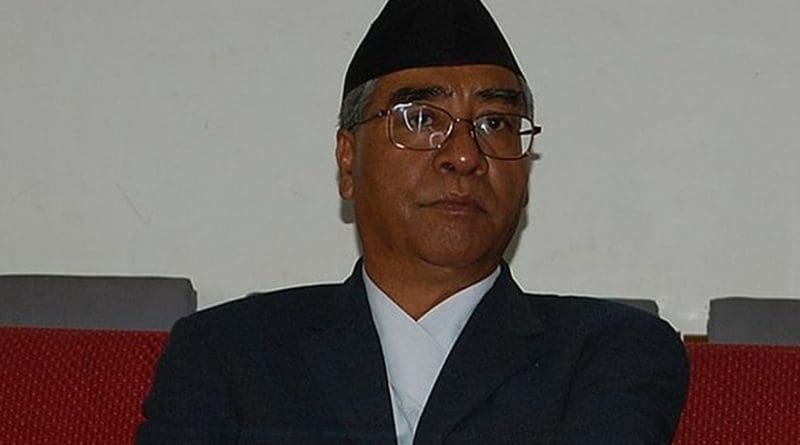Nepal: Deuba Takes Over As 40th Prime Minister – Analysis
By SAAG
By Dr. S.Chandrasekharan
Sher Bahadur Deuba of the Nepali Congress took over as 40th Prime Minister on 6th June on the basis of an understanding with former PM Dahal who resigned after the first phase of the Local Body Elections.
Deuba has returned to power for the fourth time after 12 years when he was unceremoniously sacked by King Gyanendra for his “incompetence.” He now obtained 388 votes in an assembly of 593 members- close to 65 percent and quite close to the magic number of two thirds majority.
Deuba had in the past not proved himself as capable and some have commented in the past that he does not have the “prime ministerial material.” He has inherited many problems and has a deadline to conduct the remaining part of the local elections, the regional provincial elections and finally the national elections before 21 June 2018.
Wisely, Deuba has chosen a small cabinet with three from the Nepali Congress, three from the Maoist Centre and one from the Terai group of Madhesi People’s Rights Forum- Democratic.
The important post of Home Minister who has to oversee the three tier elections has gone to the veteran Maoist Krishna Bahadur Mahara who also holds the post of Deputy Prime Minister. What one notices is that the Nepali Congress and the Maoist Centre seem to get along well as we first saw in the first phase of local body elections.
After taking over, Deuba made the right “noise”that his priorities would be first to hold the second phase of local body elections and next to address the concerns of the Madhesi groups who continue to be adamant and finally elections to the provincial and national levels.
Deuba’s several meetings with the RJP ( a conglomerate of various Terai groups) did not yield results and while announcing that the elections to the second phase of local body elections would take place on 28th June- he declared that the elections to the 2nd province which is purely a Terain province ) will be postponed to September 18. The Election Commission was totally against any postponement of elections of any province.
In postponing the elections, Deuba made two mistakes. He assumed that it had the concurrence of the RJP which continued to demand constitutional amendments and increase in the number of units in the local bodies of 18 Terain districts before contesting in the local body elections. The result was that the Terain Group has restarted its protests from 14th June and Rajendra Mahatao has threatened that it will be the “final agitation.” One does not know what he meant as “final” but he is not likely to succeed as the people in Terai are in no mood to continue protests. As a first step what he should have done is to get all the criminal cases against the agitating Terains withdrawn and release those arrested.
The second mistake Deuba did was in not consulting his own party colleagues before postponing the elections in province 2, to September 18. He needs to realise that good performance of Nepali Congress in the next few months till the final national elections is very crucial and he has to take all the members on board or other wise the UML with its nationalistic platform is likely to steal a march over his party.
The RJP which has genuine and sincere leaders like Mahant Thakur, Rajendra Mahatao and Anil Jha should make an introspection on their future as also the future of Terai and its people in view of continued agitation that takes them no where except for more loss of lives.
One- The UML that holds the numbers to reach the magic number of two thirds approval for constitutional amendment continues to be adamant and would talk of amendments only after the elections to all the three tiers. Buoyed up by their performance in the first phase of local body elections, they are in no mood to relent and feel that any concession to the Terain would affect their vote bank adversely. The RJP made no real move either towards the UML to have a dialogue with them.
Two- The Supreme Court has stayed the order of the government to increase the number of local units in proportion to the population in the local body elections and the government’s appeal for revision of the order has also not been accepted. Therefore it is not that the government of either Dahal or Deuba have not tried but are unable to go ahead in view of adverse numbers and the intransigence of the UML.
Third- and most important the other two Terain Groups- the Madhesi People’s Rights Form- Democratic of Gacchadar and the Federal Social Forum of Nepal of Upendra Yadav have decided to move away from the RJP and contest the 2nd phase of the elections in provinces 1,5 and 7 and later of province no. 2 on September 18 this year. The Terain groups are split and this is not in the interest of the people of Terai who have suffered immense loss of lives and hardship.
It is hoped that good sense will prevail as other wise the party that genuinely works for the poor Terain people will become irrelevant soon.

